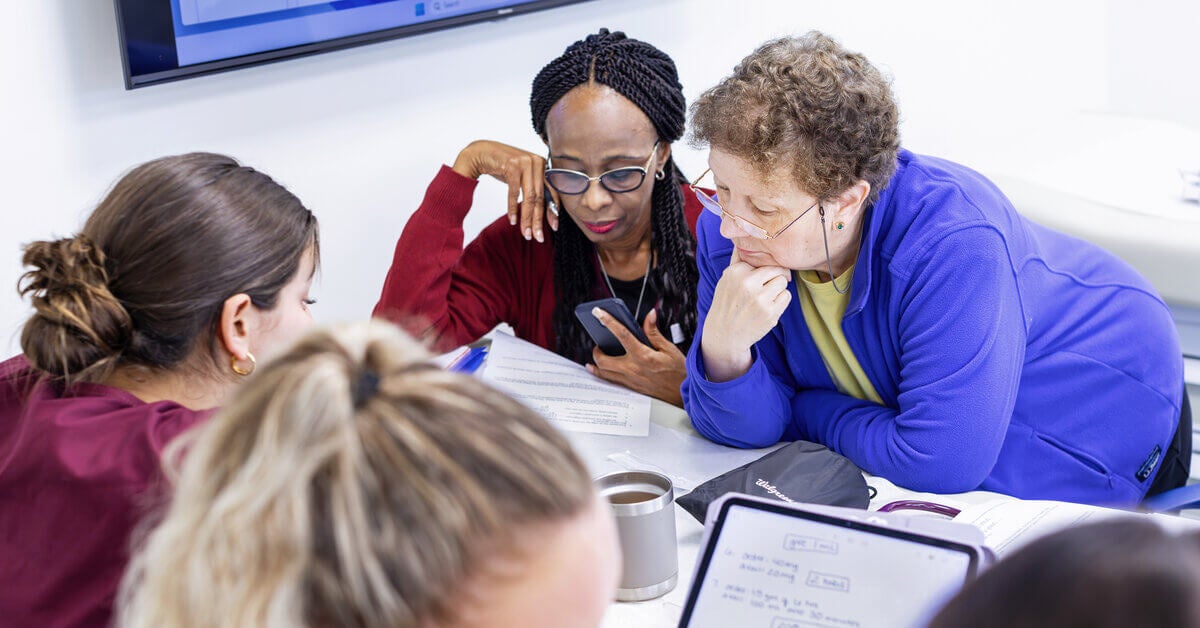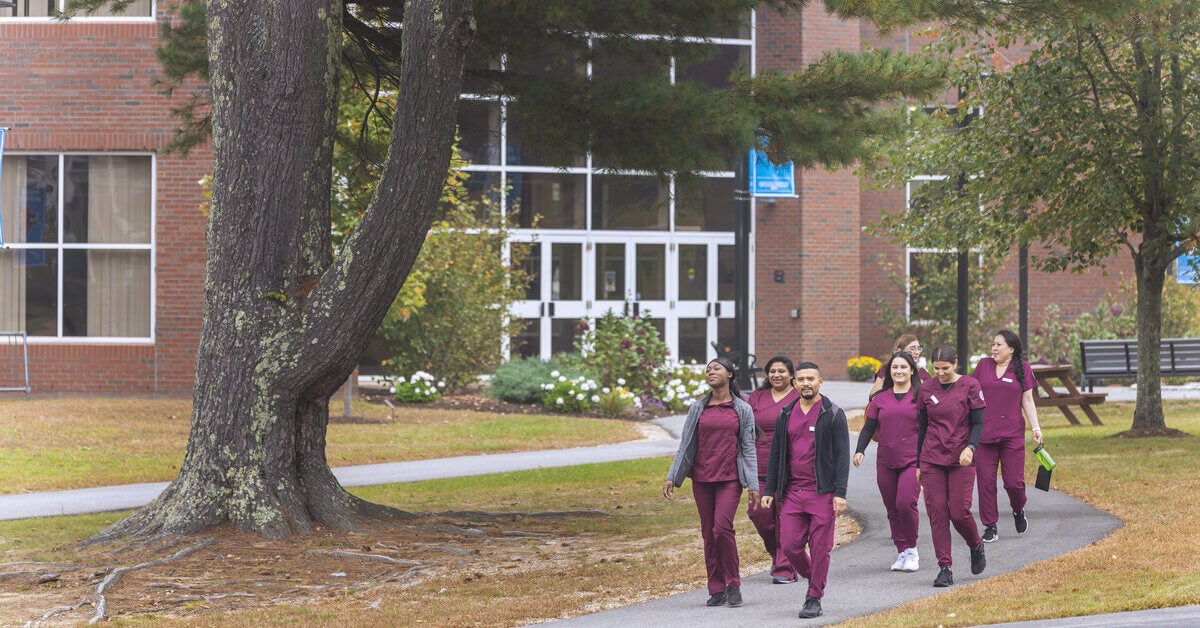What to Know about the Role of a Community Health Nurse
Community health/public health nurses are the largest segment of the U.S. public health workforce, so they play a vital role in creating healthy, equitable communities. They positively influence population health and can grow rewarding careers outside traditional healthcare settings.
Keep reading to learn about the role of a community health nurse, how they make a difference, and how you can embark on a fulfilling career in community-based nursing.
What Is Community Health Nursing?
According to the American Public Health Association (APHA), community health nursing is the “practice of promoting and protecting the health of populations.” Also known as public health nursing, it strives to further social justice and equity so that every population achieves optimal health.
Community health nurses serve individuals, families, and communities. They provide preventative and primary care and participate in advocacy, policy development, and planning to address the many environmental, physical, and social determinants of health.
Community-based nursing promotes health and well-being, maintains population health, and prevents illness, injury, and disability.
What Does a Community Health Nurse Do?
The role of a community health nurse is multifaceted. Generally, community health nurses may carry out any of the 10 Essential Public Health Services, including:
- Assessing and monitoring population health.
- Strengthening, supporting, and mobilizing communities and partnerships.
- Creating, championing, and implementing policies, plans, and laws.
The day-to-day activities of a community health nurse depend on where they work. A few examples are direct patient care, community outreach, and policy and advocacy.
Direct Patient Care
The role of a community health nurse can involve providing direct patient care.
Many community health nurses serve at-risk populations, such as people experiencing homelessness, people of color, and individuals with chronic diseases. These groups have an increased risk of poor health outcomes due to the disparities they face.
Community health nurses provide culturally competent, patient-centered care. They recognize and respect the diversity of the individuals and communities they serve, tailoring their approach to meet the unique needs of each person.
The direct patient care duties of community health nurses include:
- Performing health assessments and screenings to identify risk factors and social determinants of health.
- Educating patients on disease prevention and self-care so they can adopt healthy behaviors and manage chronic conditions.
- Triaging patients and providing medical care during natural disasters or humanitarian crises.
- Coordinating care with other healthcare providers and connecting patients to community resources and social services.
Community Outreach
Community health nurses partner with organizations and other healthcare providers to promote healthy behaviors and improved outcomes. Collaborative efforts take many forms, from health promotion and essential healthcare to community health assessment, such as:
- Developing and implementing health promotion activities, such as workshops and support groups, to empower community members to make healthy choices and improve their well-being.
- Delivering essential healthcare services to improve access and meet the community’s health needs, including blood drives and mobile clinics.
- Collaborating on health assessments, surveys, and research studies to collect data that develops programs addressing community health needs.
Policy and Advocacy
Another role of a community health nurse is promoting health equity.
Health equity refers to the presence of fair and just opportunities for everyone to attain optimal health. A society achieves health equity by changing the systems and policies that have created racial and ethnic health disparities.
Community health nurses advocate for policies that improve population health. They participate in policy analysis and development, legislative advocacy, and other activities that support the health and well-being of individuals and communities:
- Analyzing current policies about public health to identify strengths and opportunities for improvement.
- Communicating the health needs and experiences of vulnerable populations to planners and policymakers.
- Engaging with legislators to advocate for policies aligned with public health principles.
- Providing testimony and comment at legislative hearings and public meetings to influence policy making.
Where Do Community Health Nurses Work?
Community health nurses work in various settings across the public and private sectors, including:
- State and local health departments
- Schools, colleges, and universities
- Home health agencies
- Community centers
- Correctional facilities
- Advocacy groups
- Faith-based organizations
The responsibilities and role of a community health nurse vary depending on community needs and the organization's goals. However, they share a commitment to promoting health, addressing health disparities, and advancing health equity.
Why Become a Community Health Nurse?
There are many reasons to become a nurse. Community-based nursing is an attractive career path because of the opportunities to make a wide-ranging difference, pursue diverse jobs, and enjoy job stability.
Influence Population Health
Community health nurses make a meaningful difference by improving the health of individuals, families, and their communities. They promote health, prevent disease, and improve health outcomes while reducing disparities in healthcare outcomes. Many community health nurses derive great satisfaction from creating healthier, more equitable societies.
Explore Diverse Jobs
Community health nurses have many career prospects, from government and healthcare to schools and international non-profit organizations. They work with diverse populations in the U.S. and around the world. The role of a community health nurse could focus on many different areas of public health, including direct care, public policy, or leadership.
Experience Steady Employment
The number of community health nurses has declined, creating a high demand for the profession. The percentage of RNs employed in a community or public health setting decreased from approximately 7% in 2000 to 3% in 2018. Starting a career in community-based nursing can provide job stability.
How to Become a Community Health Nurse?
There are a few steps to becoming a community health nurse. You will need to complete nursing education and then obtain nursing licensure, which involves passing a national nursing exam. Licensed RNs can apply for community-based nursing positions and pursue an optional certification in public health.
Step 1: Earn a Nursing Degree
The first step in becoming a community health nurse is earning a degree in nursing. The APHA recommends that community health nurses have a minimum of a Bachelor of Science in Nursing (BSN) because it equips nurses with foundational knowledge and skills for community nursing care:
- Clinical prevention
- Population health
- Healthcare policy
- Finance
- Regulatory environments
- Interprofessional collaboration
As a BSN student, you will grow your nursing expertise through coursework, simulations, and in-person clinical experiences.
Traditional BSN programs take four years to complete. If you have a bachelor’s degree in a non-nursing discipline, you can graduate from an accelerated BSN (ABSN) program in 11 to 18 months. ABSN programs take less time because they build on previous learning experiences, allowing students to start nursing coursework faster.
Step 2: Obtain Nursing Licensure
After graduating from a BSN program, you will need to acquire nursing licensure from the state where you plan to practice.
You will apply for licensure through your state board of nursing. The board of nursing will review your application and determine your eligibility to take the national nurse licensure exam, called the National Council Licensure Examination (NCLEX).
When you pass the NCLEX, you will become a licensed RN.
Step 3: Apply for Community Nursing Care Jobs
As a licensed RN, you can apply for community health nursing jobs. The Association of Public Health Nurses (APHN) and the American Public Health Association (APHA) are valuable resources for job opportunities. Both maintain large job listing directories.
Step 4 (Optional): Get Certified in Public Health
Community health nurses can obtain an optional certification in public health called the Certified in Public Health (CPH) credential. Administered by the National Board of Public Health Examiners, the CPH demonstrates knowledge of public health sciences and a commitment to the field.
There are several eligibility pathways for the CPH. RNs with a BSN are eligible once they have at least five years of public health work experience.
Start Your Career in Community Nursing Care with Saint Joseph’s College of Maine
Community-based nursing is a versatile and stable career path for improving social justice, health equity, and population health outcomes. Does the role of a community health nurse interest you?
You can change careers and become a BSN-prepared nurse in 15 months through the Hybrid Accelerated Bachelor of Science in Nursing (ABSN) program from Saint Joseph’s College of Maine (SJC). The accredited program is designed for individuals with a bachelor’s degree in any field, and no nursing experience is required.
Aspiring nurses choose SJC because of its emphasis on community. SJC welcomes people of all faiths, ages, and backgrounds. Together, students, faculty, and staff recognize learning as a tool for lifting themselves up in service to others.
Students learn in a community built on mutual respect and receive individualized attention, guidance, and mentoring from a team of passionate, experienced educators. Saint Joseph’s College of Maine’s BSN graduates have a first-time NCLEX pass rate of over 90%, demonstrating their readiness for a meaningful and rewarding career in nursing.
Start your path to promoting community health as a nurse. For more information, obtain your ABSN program guide today.



